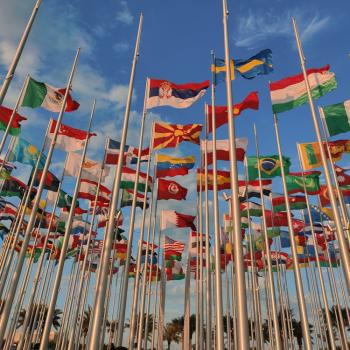 Wealth, government, industry and science, all are goods in and of themselves. But each of them can be taken as a good over and against other, greater goods, using the limited good which they have for the sake of evil. This is how and why they can become great powers which we must resist when they are abused. As Dorothy Day explained, when we come face to face with these powers, we might feel overwhelmed, yet we must not stop the fight; we must not give in. We must hope beyond hope, praying for the strength of character and the grace necessary to do all that we need to do to resist the evil which comes out of the abuse of such great goods, even if it means we have to sacrifice much in order to restore the common good:
Wealth, government, industry and science, all are goods in and of themselves. But each of them can be taken as a good over and against other, greater goods, using the limited good which they have for the sake of evil. This is how and why they can become great powers which we must resist when they are abused. As Dorothy Day explained, when we come face to face with these powers, we might feel overwhelmed, yet we must not stop the fight; we must not give in. We must hope beyond hope, praying for the strength of character and the grace necessary to do all that we need to do to resist the evil which comes out of the abuse of such great goods, even if it means we have to sacrifice much in order to restore the common good:
We know how powerless we are, all of us, against the power of wealth and government and industry and science. The powers of this world are overwhelming. Yet it is hoping against hope and believing, in spite of “unbelief,” crying by prayer and sacrifice, daily, small, constant sacrificing of one’s own comfort and cravings – these are the things that count.[1]
When government, which should seek for justice and enforce it by working for the common good, becomes tyrannical, those who feel the full threat of the injustice will no longer support their own government; instead, they will accept outsiders coming in, taking over, with the hope such outsiders will restore justice and government will once again work for the common good.[2] Those who oppose tyrants will be called traitors, but in reality they will be true patriots because they care for the people and not just the honors of state. Thus, as St. Salvian the Presbyter saw Rome being conquered by so-called barbarians, he understood the barbarians were seen as liberators instead of invaders:
All the while, the poor are despoiled, the widows groan, the orphans are tread underfoot, so much so that many of them, and they are not of obscure birth and have received a liberal education, flee to the enemy lest they die from the pain of public persecution. They seek among the barbarians the dignity of the Roman because they cannot bear barbarous indignity among the Romans. [3]
This was because the officials of Rome had long used the power of office for personal gain at the expense of the people:
As regards people in high places, of what does their dignity consist but in confiscating the property of the state? As regards some whose names I do not mention, what is a political position, but a kind of plunder? There is no greater pillaging of poor States than that done by those in power. [4]
Salvian understood that those who have more power and authority, likewise, are more at fault for their sins than those who have little or no power of their own:
Theft in all men is a crime, but without a doubt, a Senator who steals is more to be condemned than one of the lower classes. Fornication is forbidden to all, but it is much more serious if it is done by one of the clergy than by one of the people. [5]
It was not just government officials, but clergy who supported the government at the expense of the people who Salvian thought had brought God’s providential judgment against Rome. For this reason, Salvian wrote many critical words his fellow Christians and the way the church had allowed itself to be used by the state:
You, the Church, have become weaker as your fertility has progressed. You fall back as you go forward, and , as it were, you are weaker because of your strength. Indeed, you have spread throughout the whole world members who bear the name of Christians, but who do not possess the force of religion. Thus, you have begun to be rich in number and poor in faith.[6]
The cries of the people, the cries of the poor, the orphan, the widow, the stranger, the foreigner abused and enslaved, had been heard by God. The power which seemed so overwhelming was overwhelmed, and the people found their hope for change approved by God.
We are all called to do what is good. When evil is presented as a choice, we must reject it; then we can seek peace in the good and pursue it: “Depart from evil, and do good; seek peace, and pursue it” (Ps. 34:14 RSV). There is no peace in evil, there is only despair. There is peace in evil. If we want happiness, we must reject the evil, depart from the principles and ideas which justify it, and go forward to the good, pursuing true peace of the soul in following the true and proper good. When the powers that be tell us to do evil, we depart from the powers that be, looking instead to those who offer us the good, wherever they shall be found. We might feel powerless when those with power and authority, established for the sake of the good, use it for the sake of evil; where shall we turn? Yet, we must fight and resist, even if it means we sacrifice ourselves for the common good. When we are confronted with a government which denigrate innocents seeking asylum, we must resist; when our government is heartless, throwing away countless lives of children, not only by separating them from their parents but turning them and others into trafficking victims, we must speak out, fight the good fight, and hope not only that judgment will come and right the wrongs which have been done, but judgment will replace those who abuse their power with others who seek for and pursue the common good.
[IMG=Dorothy Day By Unknown photographer [Public domain], via Wikimedia Commons]
[1] Dorothy Day, The Reckless Way of Love: Notes on Following Jesus. Ed. Carolyn Kurtz (Walden, NY: Plough Publishing House, 2017), 16.
[2] Immigrants, as they hope for a better future for themselves, also hope for a better future for the nation they immigrate to. Those who fear them fear the loss of power and privilege they have more than anything else because they know the immigrants will change the face of the nation and their privileges will be questioned.
[3] St. Salvian the Presbyter, “The Governance of God” in Salvian the Presbyter. Trans. Jeremiah F. O’Sullivan, PhD (Washington, DC: CUA Press, 1962), 135.
[4] St. Salvian the Presbyter, “The Governance of God,” 97.
[5] St. Salvian the Presbyter, “The Governance of God,”111-2.
[6] St. Salvian the Presbyter, “The Four Books to the Church” in Salvian the Presbyter. Trans. Jeremiah F. O’Sullivan, PhD (Washington, DC: CUA Press, 1962), 270.
Stay in touch! Like A Little Bit of Nothing on Facebook












